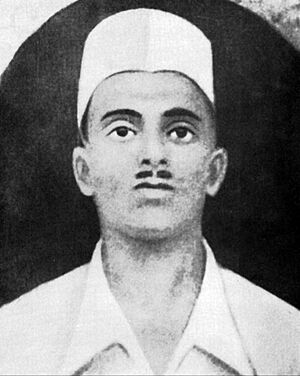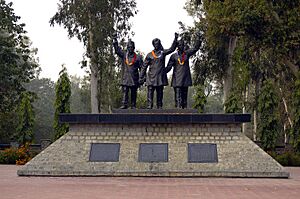Sukhdev Thapar facts for kids
Quick facts for kids
Sukhdev Thapar
|
|
|---|---|

Thapar in 1929
|
|
| Born | 15 May 1907 |
| Died | 23 March 1931 (aged 23) |
| Cause of death | Execution by hanging |
| Nationality | British Indian |
| Occupation | Armed revolutionary |
| Organization | HSRA Naujawan Bharat Sabha |
| Known for | Contribution in freedom struggle |
| Movement | Indian Independence movement |
Sukhdev Thapar (born May 15, 1907 – died March 23, 1931) was a brave Indian freedom fighter. He worked hard to free India from British rule. He was a key member of a group called the Hindustan Socialist Republican Association (HSRA). Sukhdev was executed on March 23, 1931, along with his friends Shivaram Rajguru and Bhagat Singh.
Contents
Early Life of Sukhdev Thapar
Sukhdev Thapar was born in Ludhiana, Punjab, which was part of British Raj at the time. His birthday was May 15, 1907. His parents were Ramlal Thapar and Ralli Devi.
Sukhdev came from a Hindu family in Punjab. After his father passed away, his uncle, Lala Achintram, raised him.
Sukhdev's Fight for Freedom
Joining the Hindustan Socialist Republican Association
Sukhdev Thapar was an important member of the Hindustan Socialist Republican Association (HSRA). He also belonged to another group called the Naujawan Bharat Sabha. He helped start many freedom movements in Punjab and other parts of northern India. Sukhdev was the leader of the HSRA in Punjab and helped make many big decisions.
He took part in several important events, including a hunger strike in prison in 1929. Sukhdev is well-known for his actions during the Lahore Conspiracy Case from 1929 to 1930. He played a role in the events of December 17, 1928, which involved a British police officer named J. P. Saunders. This action was a response to the sad death of a senior leader, Lala Lajpat Rai.
The Lahore Conspiracy Case
Sukhdev was a main person in the 1929 Lahore Conspiracy Case. This case was about a bombing that happened at the Central Assembly Hall in New Delhi on April 8, 1929. Sukhdev and his friends were arrested for this event.
After being found guilty, Sukhdev, Bhagat Singh, and Shivaram Rajguru were sentenced to death. They were executed on March 23, 1931, at Lahore Central Jail. Their bodies were secretly cremated (burned) by the Sutlej River.
Public Reaction to the Executions
The news of their executions spread quickly, especially because it happened on the same day as a big meeting of the Indian National Congress in Karachi. Many people were upset by the news.
B. R. Ambedkar, a famous leader, wrote in his newspaper that the British government was to blame for the executions. He felt that the decision to execute the three young men was not fair.
Sukhdev's Legacy
The Hussainiwala National Martyrs Memorial is a special place located in Hussainiwala. This is where Sukhdev, Bhagat Singh, and Rajguru were cremated. Every year on March 23, people observe Martyrs' Day (Shaheed Diwas) to remember them. Many people visit the memorial to pay their respects.
A college in Delhi, Shaheed Sukhdev College of Business Studies, is named after Sukhdev. It is part of the University of Delhi and was started in 1987.
The main bus station in Ludhiana, Sukhdev's birthplace, is also named after him: Amar Shaheed Sukhdev Thapar Inter-State Bus Terminal.
See also
- Ashfaqulla Khan
- Kakori Train Robbery
- Naujawan Bharat Sabha
- Revolutionary movement for Indian independence
Images for kids



